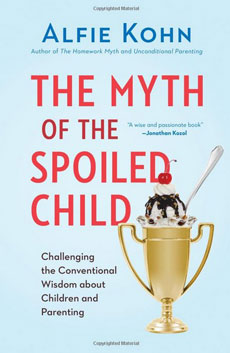"Confusing respect with deference. Author Wendy Mogel can barely contain her indignation about parents who 'actually feel guilty about demanding respect from their children'! Her twin assumptions, which many others hold as well, are that kids have an obligation to be respectful and that parents who fail to insist on this are permissive pushovers.
"But what is meant by respect? (1) Does it refer to treating others decently rather than rudely? In that case, sure, everyone should be respectful of everyone else — although demanding this, let alone enforcing such demands with threats, is hardly an effective strategy for making it happen. (2) Does it refer to an appreciation for the qualities of a particular person, such as courage or compassion? If so, then it's absurd to insist that children feel this way about someone just by virtue of age or position. (3) Does it refer to showing deference and even fear? This is the only sense in which 'respect' can be compelled, and on closer inspection it does seem to be what some people are looking for. 'Your child has a chance to demonstrate how much she honors you by cooperating promptly and without a fuss.' This is a demand for mindless obedience dressed up with a word that's more . . . respectable. (As Albert Camus put it, 'Nothing is more despicable than respect based on fear.')
"Now imagine a parent who tries to teach children the importance of showing respect in sense 1 (for all people), who tries to prove worthy of respect in sense 2, and who avoids demanding 'respect' in sense 3. Is such a parent admirable or a shameful example of how our culture has lost its way? Those of us who vote for 'admirable' may notice how rarely respect (in sense 1) is shown to children. Face it: Kids' objections are routinely dismissed by adults; their perspectives are seldom taken seriously; they are interrupted at will and frequently addressed in a tone that parents would never permit anyone to use with them. Such treatment isn't just common; it's expected — to the point that it seems a little odd even to talk about 'treating children (dis)respectfully.' We're not used to applying that word to children, only to adults. By the way they treat children, many traditionally minded parents are also setting an example of disrespectful behavior for them — and are likely to be outraged if the children proceed to imitate what they've seen."
